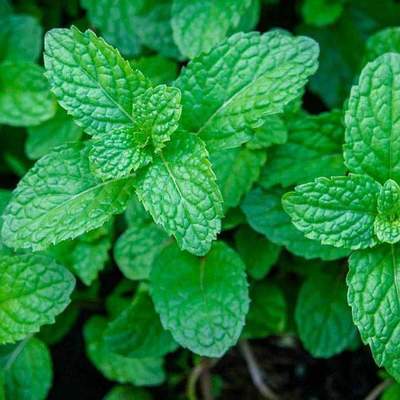
Mint Seeds
 Gangagardens
Gangagardens
Mint is a perennial with very fragrant, toothed leaves and tiny purple, pink, or white flowers. It has a fruity, aromatic taste.
Images are for reference purposes only.
Actual product may vary in shape or appearance based on climate, age, height, etc.
The product is replaceable but not returnable.
Item Details
SKU
AVMNTSED21
How to plant Mint
Mints are vigorous perennials that thrive in light soil with good drainage. Ideally, they prefer a moist but well-drained site, something like their native habitat along stream banks. Most will tolerate some shade, and the variegated types may require some protection from direct sun. For growing outdoors, plant one or two purchased plants (or one or two cuttings from a friend) about 2 feet apart in moist soil. One or two plants will easily cover the ground. Mint should grow to be 1 or 2 feet tall. For the best growth in confined areas such as containers, topdress plants with a thin layer of compost or organic fertilizer every few months. Aboveground pots will need winter protection in cold climates. In the garden, plant mint near cabbage and tomatoes—in pots, if possible, in order to prevent it from spreading and stealing nutrients from your crops!
Care
Minimal care is needed for mint. For outdoor plants, use a light mulch. This will help keep the soil moist and keep the leaves clean. For indoor plants, be sure to water them regularly to keep the soil evenly moist. At first, mints develop into well-behaved–looking, bushy, upright clumps, but they soon set out to conquer new territory with horizontal runners and underground rhizomes. Unless you block the advance, a pert peppermint plant can turn into a sprawling 4-foot giant in just 1 year. It’s not the stuff of horror movies, however. Mints benefit from picking and pruning. They are shallow-rooted and easy to pull out, so there’s no reason to worry, as long as you provide physical barriers such as walls, walkways, or containers.
Pests/Diseases
Powdery mildew,Rust,Leaf spot,Anthracnose, Stem canker Mice dislike the smell of peppermint. Spread it liberally where you suspect the critters. Mint is also considered a deer-resistant plant.
_-_Bulbs_(set_of_10)_2.webp)
_-_Bulbs_(set_of_10)_3.webp)